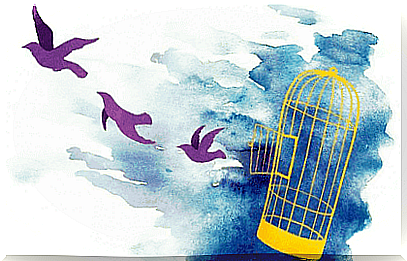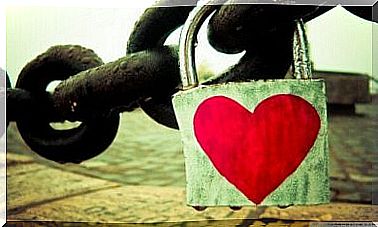Do You Often Ask For Forgiveness? Excess Can Affect Self-esteem

Do you ask for forgiveness often? Saying “I’m sorry” in principle is one of the social “glues” that reinforce our relationships. However, doing it constantly can weaken our self-esteem. Let’s think that the act of apologizing should be something punctual and meaningful, not a continuous and almost obsessive exercise, where we somehow demonstrate our lack of confidence.
“Sorry to bother you, but can I ask you a question?”, “Sorry, can you leave the pen there?”, “Sorry, but I think…” We could give a thousand examples of situations where the word “sorry” becomes the protagonist of our conversations.
Something that might at first be a distinguishing feature of our politeness or politeness sometimes becomes a dynamic with negative implications for ourselves.
Jean de la Bruyere said that there is only one permissible excess in our world, and it is none other than showing true gratitude. The act of giving thanks is not the same as being truly grateful.
With forgiveness, the same thing happens. We can say this word twenty times a day, forty times even. However, it is preferable to use this term when really necessary. Let’s think about it.

Do you ask for forgiveness often? stop apologizing excessively
Asking for forgiveness often makes the other understand that he must set you free from something. Sooner or later, people around you will get tired, or even more, they will end up thinking that you don’t have enough confidence to act autonomously. So, as in any area of life, every extreme is bad, whether we abuse something or completely dismiss any dimension.
We have an example of this with Donald Trump. In one of his best-known phrases, he states that “he never apologizes because he simply never makes mistakes”. Another example of this extreme is that of Martin Winterkorn, former CEO of Volkswagen.
Although fraud committed in the transmissions of his diesel cars is amply demonstrated, it took him nearly a year to publicly apologize. When this happened, the trust of a large part of the customers was already “broken”.
On the other side of the scale are, without a doubt, all those profiles that use and abuse excuses. Sometimes out of politeness and courtesy and sometimes out of simple insecurity. They are not aware of the implications this might have.
We devalue the purpose of forgiveness
Forgiving and asking for forgiveness are two highly therapeutic exercises. They resolve conflicts, release burdens, ease tensions. Few acts carry a greater responsibility than taking the consequences of a grievance or offense to ask the other party to forgive us for it. Now, if we spend the day asking for forgiveness for petty things, the essence of forgiveness loses meaning and relevance.
we devalue ourselves
Do you ask for forgiveness often? So take a moment to reflect. How do you think others see you whenever you apologize for something that doesn’t matter? There are situations that do not justify the use of this word. Most of the time you used it, there was no real circumstance for which you needed to be forgiven.
We need to understand that asking for forgiveness will often not make us more humble, upright, or respectful. Don’t apologize for asking, for passing by, for sitting down, for that pencil you dropped, for asking for help, for breathing… Build your self-esteem and strengthen your confidence.

We ask for forgiveness as an asset to get out of certain situations
Most of us do this: we ask for forgiveness like someone who uses an asset to survive in certain situations. These are times when, somehow, our insecurity or shyness appears. Let’s think about it. It is common to ask for forgiveness when we address a stranger or someone we respect. “Sorry, can I ask a question?” “Excuse me, could you give me the key I dropped…”
The problem, therefore, more than the use of that word, is to “abuse” it; the problem arises when it becomes a persistent resource in our vocabulary, in this gear with which we move in most of our social scenarios.
When to ask and when not to ask for forgiveness?
Do you ask for forgiveness often? So you probably want to know when it’s best to do it and when not to. Working with this aspect of our behavior will make us feel more competent and confident in any situation and environment.
When to ask for forgiveness:
- Ask for forgiveness when you hurt someone.
- Do this when you have offended, disappointed, or hurt a person’s feelings.
- Ask to be forgiven when you regret a behavior, an action taken.
- Be able to ask for forgiveness every time you make a mistake and it affects others.
- Ask for forgiveness to close steps, to leave behind old resentments.
- You also need to be able to ask for forgiveness yourself. We all accumulate mistakes or inadequate choices that weigh on our present and deserve to be released, forgiven.
when not to apologize
- Don’t ask for forgiveness when giving your opinion.
- Avoid saying that word in situations where this dimension is meaningless: when you are talking to someone, when you want to ask a question, when you need to pick up something.
- Avoid asking for forgiveness when you need help.

In conclusion, although we have heard that “asking forgiveness makes us strong”, let us understand that everything has a limit. Because sometimes abuse misrepresents the real and powerful meaning of this healthy term and we end up losing self-esteem. Let us make correct and wise use of this wonderful dimension.









